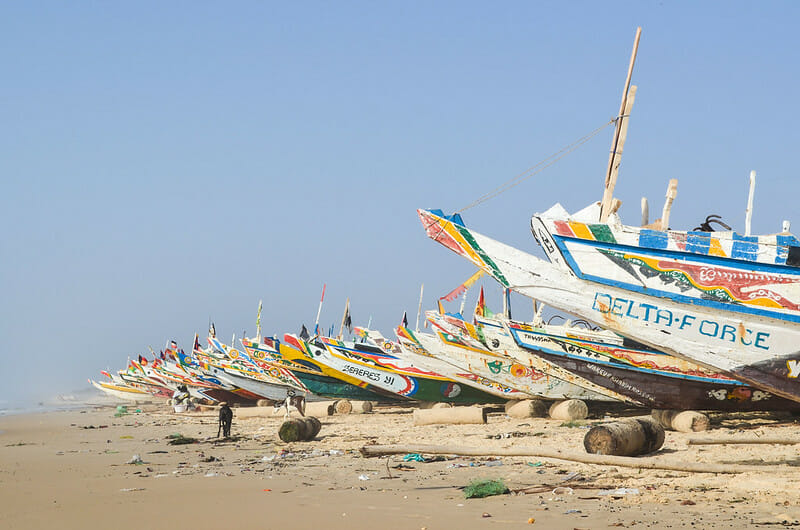Up to 90% of Senegal’s fisheries are fully fished or facing collapse, according to the Food and Agriculture Organisation of the United Nations (FAO). blue
“They’ve sold the sea,” says 46-year-old Mohammed Faye, a lifelong artisanal fisherman from Senegal, grounded on the beach.
The once-thriving industry has been decimated in the last few decades, as the Senegalese Fisheries Ministry has cast a corrupt and blind eye to unsustainable, economically foolish fishing practices, issuing licenses to Chinese and European industrial fleets, who over-fish in protected areas. This has ultimately resulted in placing its artisanal fishing community at risk of collapse.
#25YEP: 'fishing industry is a good example of natural capital in action'.
Unsustainable fishing is killing our oceans. pic.twitter.com/D6vJ0fX3KN
— Blue Marine Foundation (@Bluemarinef) January 11, 2018
Moreover, the surge in the number of migrants making the dangerous Atlantic crossing from West Africa to the Canary Islands has recently taken tragic proportions. Fishermen’s sons are dying in the sea, the sea that it was their right to live on, their sustenance and their cultural heritage.
This picture is a far cry from the vision of Africa’s “blue economy”, that the African Union (AU) has called “the new frontline of Africa’s renaissance” in 2013.
Article 1 of the African Charter on Maritime Security, Safety and Development in Africa (the Lomé Charter, 2017) defines the Blue/Ocean Economy, as “sustainable economic development of oceans using such techniques as regional development to integrate the use of seas and oceans, coasts, lakes, rivers, and underground water for economic purposes.”
The Lomé Charter goals include “fisheries, mining, energy, aquaculture and maritime transport”, and the Charter adds that this will be done “while protecting the sea to improve social wellbeing.”
Such a system is essential to any long-term view of African development, and it’s easy to see why it was once a source of heady optimism. There is a lot of potential in Africa to make traditional practices more efficient, creating more jobs and increasing quality of life.
For example, 12.3 million Africans are employed in fishing, and by expanding this through adherence to a sustainably fishing model, underused resources and food could be provided to nearly 200 million other Africans, according to the United Nations Economic Commission for Africa (UNECA).
Related Articles: The Blue Economy: Water, Salty or Sweet, Our Lives Depend on It | European Maritime Day BlueInvest Workshop Roundup | Greening The Economy: How Manufacturing, Technology & Individuals Can Help
This optimistic vision has failed to come to fruition. While the AU describes the Lomé Charter as “a concrete manifestation of [a] pan-African drive,” only two countries have ratified it since it was first drafted in 2017.
As much as the African Union might value the importance of the blue economy, it is clear that most African states do not want to ratify a legally binding document that would require from the signatories a real commitment to sustainable development and maritime security.
Meanwhile, in a new report from the AU’s Peace and Security Council, violence and corruption are deemed to hold sway over the continent’s maritime economy. The report cites the unresolved sea boundary disputes in Eastern Africa, including the Horn of Africa, as well as illegal arms and drug trafficking, and piracy.
Eight years after the African Union hailed a new frontier in the African renaissance, Africa’s coasts remain as inefficient and exploited as ever. In West Africa, 50 crew kidnappings have been reported in the past six months.
“Continued instability and insecurity at sea undermines states’ ability to secure trade routes, protect and harness the benefits of their blue economies, and ensure inclusive economic growth and social development for coastal communities,” says the Peace and Security Council. “Africa’s governments must come up with strategic frameworks if their people are to reap the benefits of this potential bounty.”
It seems that Africa’s governments might already be reaping the bounty.
The research group Marine Frontiers have published a research document pointing out that “In Africa, much of the emphasis on the Blue Economy (BE) is placed on economic gains; as a result, traditional livelihoods and small-scale local operations are outcompeted by international corporations and government initiatives, with little to no regard for social inclusion and environmental sustainability.”
The lack of consensus and cooperation with the African Union has meant that any cohesive and enforceable security apparatus for the continent’s maritime activities has remained an idea uselessly birthed and defined by an international organisation. The Marine Frontiers’ report certainly rings sadly true in Senegal, where the “development” of the blue economy has constituted the pawning off of natural resources to foreign exploitation.
Editor’s Note: The opinions expressed here by Impakter.com contributors are their own, not those of Impakter.com — In the Featured Photo: Traditional Fishing Boats in Mboro, Senegal. Featured Photo Credit: jbdodane.










